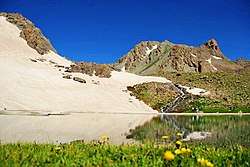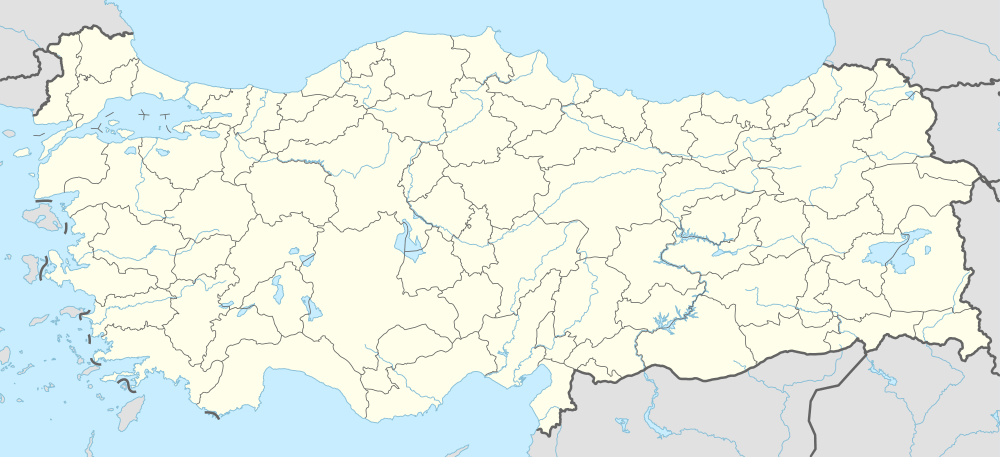Yeşiltaş, Yüksekova
| Yeşiltaş | |
|---|---|
 Lake Sat | |
 Yeşiltaş | |
| Coordinates: 37°34′00″N 44°17′00″E / 37.56667°N 44.28333°ECoordinates: 37°34′00″N 44°17′00″E / 37.56667°N 44.28333°E | |
| Country | Turkey |
| Province | Hakkâri |
| Government | |
| • Mayor | Ruken Yetişkin (BDP) |
| • Kaymakam | Üzeyir Aziz Özeren |
| Elevation | 1,950 m (6,400 ft) |
| Post code | 30300 |
| Website | www.yuksekova.bel.tr |
Yeşiltaş is a village in Yüksekova in Hakkari province, Turkey.[1] During the republican period, the region was settled by an tribal tribe called Jilu.
History
The oldest name of the village, during the Armenian and Assyrian settlement, is Iştazn.[2] In 1985, the Gendarmerie Border Police Station was established in the village where the village was founded and in 2011 the police station was changed to the Reinforced Gendarmerie Public Security Police Station. Despite the evacuation of riotous villages in 1997 due to terrorism, the village has not been evacuated. However, due to the livelihood of terrorism, the villagers are migrating to the center of the district of Yüksekova, Van and other cities.
Geography
The village has a dry-summer humid continental climate with hot summers and cold, snowy winters. It is covered with poplar and oak trees.
Culture
Every year in May, lamb clipping day is organized in order to celebrate the arrival of spring. The other villages and district dwellers are invited in the village of Kuzu kırmnan and picnics are made in the mood of the feast. Herb cheese, walnut and beanbag are made from the grasses grown in the mountains in the region. There is also an inverse tulip flower that is not found in the world.
Population
| Yıllara göre köy nüfus verileri | |
|---|---|
| 2012 | 459 |
| 2011 | 575 |
| 1990 | 1091 |
Economy
In addition to animal husbandry and agriculture, the village's economy is mainly based on the money coming from the village guard system. At least one person from almost every family is a guardian. The grapes are renowned. More livestock breeding is done. There are three grocery stores in the village.
Infrastructure
There are two primary schools in the village. The village does not have drinking water network and sewer network, but there is spring water. There is no PTT branch and PTT agency. There is no health center and no health home, but the doctors of the Gendarmerie station in the village are offering villagers health services. The pavement was expanded in 2010, providing transportation for the nobility. There is electricity and land lines in the village.
See also
- Tyari, an Assyrian tribe
- Nochiya tribe
- Gawar
References
- ↑ https://www.yerelnet.org.tr/koyler/koy.php?koyid=247935
- ↑ Layard, Austen Henry, Discoveries in the ruins of Nineveh and Babylon: with travels in Armenia, Kurdistan and the desert: being the result of a second expedition undertaken for the Trustees of the British Museum, London: G.P. Putnam and Co., 1853, p. 434